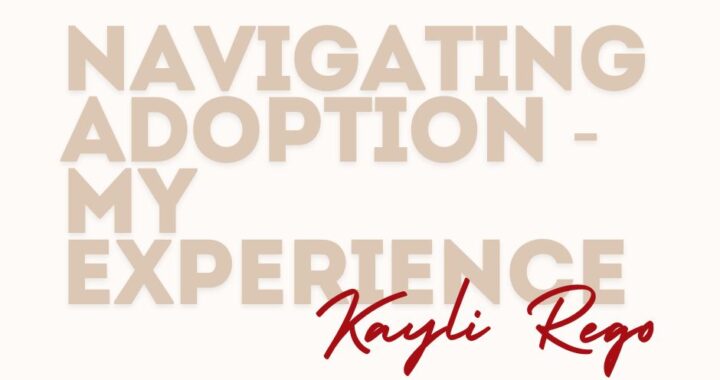Hi, I’m Kayli. In light of the recent changes in China’s international policy, I wanted to share my experience as a Chinese-American adoptee. I’m one of the 82,000 girls adopted from China during a three-decade period (Master, F. (2024, September 6). I was adopted from Anhui Province when I was 13 months old. For the first year of my life, I lived in an orphanage after being found on Weisi Road outside a migrant factory. I believe my birth parents were migrant workers, and if the stars align, I hope to locate my birth relatives someday. As I transition to living independently and supporting myself, I find myself pondering every detail of my past. I have no record of my medical history, and all I have to document my early years is a single baby photo taken hours after my birth and abandonment. I wasn’t even a day old and I was left to fend for myself in the middle of the winter.
During my junior year of high school, I joined a birth parent search group and created a poster detailing my abandonment. This poster has been shared in various WeChat groups, but I haven’t received any recent updates. Growing up as an adoptee in a predominantly white community presented many challenges that shaped who I am today. I often caught double-takes and prolonged stares, followed by awkward smiles, making me feel like a zoo animal—an attraction to gawk at. I struggled with my Chinese-American adoptee identity and felt excluded from the Chinese aspects of my heritage. I’m continuously working to learn about my lost culture.
Recently, I’ve realized that I don’t need to fit perfectly into either culture; I can create a unique identity based on my own experiences. Since starting college, I’ve formed close relationships with other Chinese adoptees, which has helped me further accept my evolving identity. In fact, some of my best friends are fellow adoptees I’ve met along the way.
On September 6th, 2024, breaking news hit my community: China announced it would end foreign adoptions. This decision follows a significant decline in international adoptions during the COVID-19 pandemic, which stalled many processes for safety reasons (Gan, N. (2024, September 6)). The government cited a need to combat the declining birthrate, a legacy of the one-child policy, which officially ended on January 1st, 2016. US diplomats reported that despite hundreds of adoptions still under contract, none can be finalized (Davidson, H. (2024, September 5). Mao Ning, the Foreign Ministry spokeswoman, stated, “Apart from the adoption of a child or stepchild of blood relatives within three generations, China will not send children abroad for adoption” (Master, F. (2024, September 6).
The thought of children facing this situation fills me with despair. I can’t imagine telling a child they’re going to have a family, only to have that hope taken away, forcing them to remain in the institutions they’ve known all their lives. While many orphanages are nurturing and full of love, the security of a family unit is hard to replicate. I also empathize with the prospective parents. Many of my adoptee friends were adopted because their families couldn’t have biological children. The heartbreak of discovering they can’t conceive, only to learn midway through the adoption process that it’s no longer possible, is profound. The emotional trauma given to the children and prospective facilities will haunt them for the rest of their lives. Often, families receive photos of the children before adoption. Imagine the pain of holding a picture of a child they’ve formed an emotional bond with, only to realize they will never bring them home. It must feel like a prison, starting with that photo but knowing it will never lead to a family.
Adoptees can be affected by their adoptions for the rest of their lives. Personally, I’ve struggled with reaching out for help during times of distress. It has taken many conversations with loved ones to unlearn toxic thinking. I’ve had to confront the belief that I must fend for myself, a mentality I adopted as a newborn. I came into the world without anyone and it is a constant struggle to realize that I am not alone in this life.
As I continue to explore my identity in the context of adoption, I know the effects will manifest in various ways throughout my life, potentially causing emotional distress. Fortunately, I have a strong support system and have learned to lean on those individuals in times of need. If anyone has thoughts on this topic or has been personally affected by adoption, I would love to hear your story!
Resources
Davidson, H. (2024, September 5). China says it is ending foreign adoptions, prompting concern from US. The Guardian; The Guardian. https://www.theguardian.com/world/article/2024/sep/06/china-ending-foreign-adoption-international-intercountry
Gan, N. (2024, September 6). China is ending foreign adoptions of its children. That leaves hundreds of American families in limbo. CNN; CNN. https://www.cnn.com/2024/09/06/china/china-ends-foreign-adoptions-children-intl-hnk/index.html
Master, F. (2024, September 6). China stops foreign adoptions of its children after three decades [Review of China stops foreign adoptions of its children after three decades]. Reuters. https://www.reuters.com/world/china/china-stops-foreign-adoptions-its-children-after-three-decades-2024-09-06/
